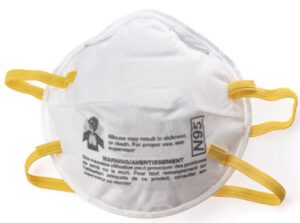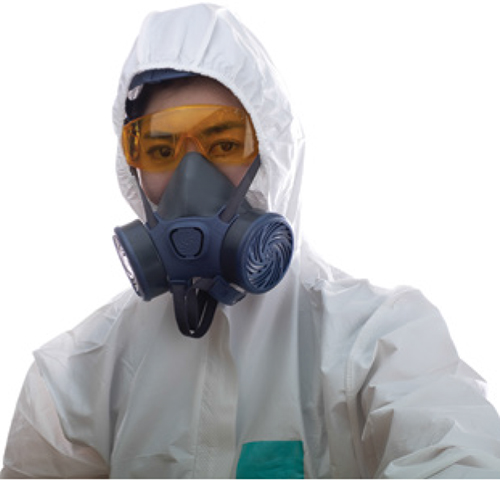Chemical process industries (CPI) facilities often present a number of potential respiratory hazards, including airborne particles, toxic chemicals and low-oxygen environments, that may require the use of respiratory personal-protective equipment (PPE). This reference outlines the major categories for respiratory protection commonly used in industrial production settings.
Particulate respirator
Particulate-matter respirators are essentially mechanical filters and are often the least expensive respiratory protection devices. Particulate-matter respirators are made from nonwoven polypropylene fibers and are designed to prevent particles, such as dust and mist (liquid droplets suspended in air) from entering breathing passages. They are not designed to protect against chemicals, gases or vapors, and are intended only for low-hazard levels.

FIGURE 1. Particulate respirators, like the N95 mask shown here, are made from non-woven polymer fibers
Within regulations to certify the selection and use of air-purifying particulate respirators, the National Institute of Occupational Safety and Health (part of the U.S. Centers for Disease Control and Prevention; www.cdc.gov/niosh) has established three designations for filter efficiency and three categories for filter efficiency degradation. The filter efficiency refers to the percentage of particles greater than a given size that are removed from air. The designations are 95%, 99% and 99.97%.
A commonly known particulate-matter filter is the N95 filtering facepiece respirator (Figure 1). N95 masks are so-called because they remove 95% of airborne particles 0.3-microns and larger in size. Some N95 masks have a valve to reduce breathing resistance during exhalation. The “N” refers to the mask’s resistance to oil. N stands for “not resistant to oil.” The other two categories are R (resistant to oil) and P (oil-proof).
Chemical cartridge respirator

FIGURE 2. Chemical cartridges remove hazardous gases and vapors from breathed air
Chemical cartridge respirators (gas masks) use replaceable chemical cartridges or canisters to remove hazardous gas and vapor contaminants from the air. This type of respirator can be a half-mask (Figure 2; nose and mouth covered), or a facepiece (covers eyes also) that are secured to the head with straps. Air passes through a cartridge or canister, which filters hazardous gases and vapors from air by various means, including absorption, adsorption and chemisorption, depending on the type of substance being removed. Chemical cartridges may also have a filter for solids as well.
Gas masks are effective only if used with the correct cartridge or filter (these terms are often used interchangeably) for a particular biological or chemical substance. Cartridges are available that protect against more than one hazard, but there is no “all-in-one” cartridge that protects against all substances.
A color-code scheme is used to aid in selection. For example, a canister coded white is designed for acid gas, while a green code means the canister is for ammonia. Other color designations include blue (carbon monoxide), black (organic vapors) and purple (radioactive materials).
Powered respirators
Powered air-purifying respirators (PAPRs) use a battery-powered fan to draw air through the filter to the user’s nose and mouth. They consist of some type of headgear (either a facemask or a hood), as well as a motor-driven fan that forces ambient air into the device, and some type of filter to remove contaminants from the air before it reaches the mouth and nose. PAPRs are easier to breathe through than gas masks and nonwoven fiber masks, but they require a fully charged battery to work properly. They use the same type of filters/cartridges as other air-purifying respirators, so it is equally essential to know which hazards are present, and at what concentration, in order to select the proper type of cartridges.
Self-contained breathing
Self-contained breathing apparatus (SCBA) systems use a dedicated air tank to supply clean air to the user, so no filters are required. This type of respiratory protection is capable of protecting against higher concentrations of dangerous chemicals. However, a SCBA system is heavy (30 pounds or more), and requires special training on how to use and maintain it. A typical SCBA air tank lasts about an hour or possibly less, depending upon the rating of the SCBA and the breathing rate and intensity of the user.
Resources
OSHA, General Respiratory Protection Guidance for Employers and Workers, U.S. Occupational Safety and Health Administration, OSHA Bulletin, 2011.
California Department of Industrial Relations, Respiratory Protection in the Workplace: A guide for employees, updated April 2021, accessed online at: www.dir.ca.gov/DOSH/DOSH_Publications/respiratory-protection-employer-guide.pdf.